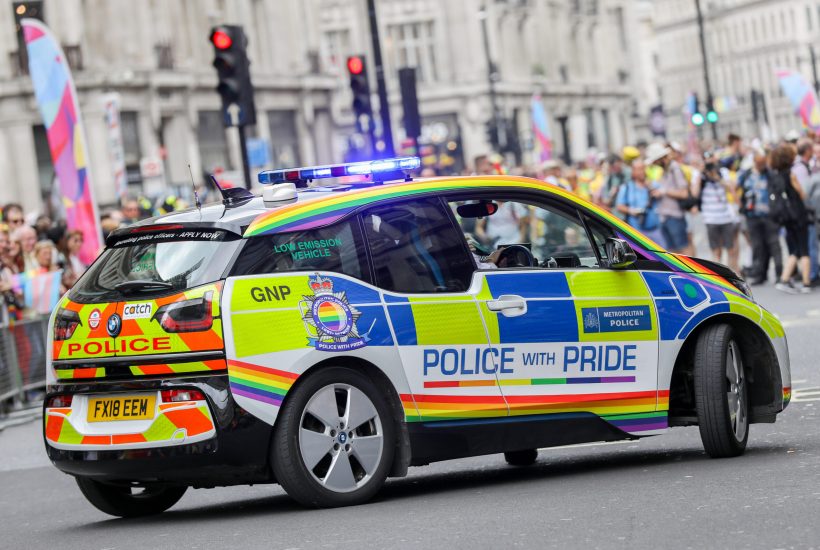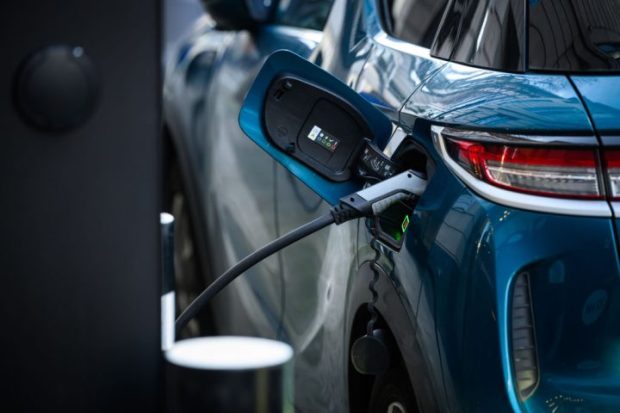The great awokening of the British constabulary has got to be the most curious and infuriating part of our culture war. While knife crime continues to rise, an inordinate amount of police time now seems to be taken up by various virtue-signalling initiatives.
Take the rise of ‘rainbow cars’. For some time now members of the public have been bemused to see cop cars patrolling their neighbourhoods emblazoned in the LGBT flag. Now the LGBT+ lead of the National Police Chiefs Council has felt the need to make an Instagram post explaining it all to us.
In the video, deputy chief constable Julie Cooke — complete with rainbow lanyard and miniature rainbow flag in the background — informs us that such schemes aren’t expensive and that the cars help ‘give confidence to our LGBT+ community, but also to other under-represented groups’ in coming forward to report hate crimes. She even dubs them ‘hate-crime cars’.
Cooke seems to think that long-running suspicions towards police among certain sections of society — not just LGBT people but also all ‘under-represented groups’ — can be addressed by an inexpensive, gay-friendly paint job. Of course the police should try to maintain good relationships with minority groups, but this is a dumb and patronising way to do it.
But more importantly, such shallow attempts at community outreach represent a broader threat to the freedoms of all citizens, whether you’re gay or straight, white or black. For as has become clear in recent years, the ‘hate crimes’ the police are so doggedly pursuing often just amount to ‘offensive’ speech.
The number of hate crimes reported to police has more than doubled in recent years. But as the Telegraph notes, police are increasingly focusing not on hate crime as such, but on statements made online and off, which are then recorded as ‘non-crime hate incidents’: 120,000 of them were logged between 2014 and 2019.
The police’s foray into policing ‘non-crime’ is as dystopian as it sounds. According to the College of Policing, non-crime hate incidents are logged when a ‘criminal offence has not taken place, but the victim or any other person perceives that the incident was motivated wholly or partially by hostility’ on the basis of religion, race, gender and so on.
The idea is to clock troublemakers who may go on to commit actual crimes — non-non-crimes, if you like. But the actual result is to produce a chilling effect on free speech, allowing anyone to report anyone else for saying something they found offensive. These black marks remain on the supposed perpetrator’s record, and can show up on advanced background checks.
The most infamous case is that of Harry Miller, the Humberside businessman who was visited by police for posting a trans-sceptical limerick on Twitter. But there are plenty more. In 2017, then home secretary Amber Rudd had a non-crime hate incident recorded against her for a speech she gave on immigration, which her accuser later admitted he hadn’t actually watched.
The ‘non-crime hate incident’ is a concept that was cooked up entirely by the College of Policing and has no basis in law. When put alongside the already extensive speech crimes we have on statute, it has led to cops going after alleged wrongthink with alarming zeal.
Merseyside Police hit the headlines in February when some officers showed up outside an Asda with a billboard proclaiming that ‘BEING OFFENSIVE IS AN OFFENCE’ – set against a rainbow-flag background, of course. Merseyside’s finest were later forced to ‘clarify’ that being offensive was not in fact an offence.
This is the dark underside of the rainbow cars. Such virtue-signalling isn’t just irritating and condescending, it’s part and parcel of a police crackdown on speech that is becoming as unhinged as it is occasionally comical: in 2019, Gwent Police posted on Facebook a mugshot of a drug dealer to call for information on his whereabouts — then, when social media users mocked the dealer’s haircut, threatened to investigate them.
Such is the power of identity politics that even the police — an institution woke activists would rather defund than celebrate — feel the need to genuflect to it. And so warped are the priorities of those running some police forces that non-criminals have become as important to them as criminals, and maintaining an offence-free ‘safe space’ is now just as pressing an issue as actually keeping people safe.
Got something to add? Join the discussion and comment below.
Get 10 issues for just $10
Subscribe to The Spectator Australia today for the next 10 magazine issues, plus full online access, for just $10.




















Comments
Don't miss out
Join the conversation with other Spectator Australia readers. Subscribe to leave a comment.
SUBSCRIBEAlready a subscriber? Log in